新Unit 4导学案3
人教版七年级英语上unit4-导学案(知识点解析)

Unit 4 Where’s my backpack?Where’s my backpack? 我的背包在哪里?Where 是疑问副词,意为“在哪里,在什么地方”,引导特殊疑问句。
句型:Where + is\are +主语(人或物)?答语:主语(人或物)+ is\are +方位介词。
如:-Where is Gina? -she’s in the classroom.注意:Where is 可以缩写成Where’s,Where are可以缩写成Where’re.翻译短语1.在沙发上_______2.在床下___ _____3.在我背包里__________4.在桌上________5.under the chair___________6.on the dresser________ _7.in the drawer__________一、选择填空。
( )1. ___________ is your new pencil case? It’s in the bag.A. WhatB. WhereC. HowD. Who( )2.Is he Jack Smith? _________________.A. Yes, he’sB. Yes, it isC. Yes, he isD. No, it isn’t( )3.The boys are ___ the tree.A. onB. inC. toD. for( )4.-Where are Lucy’s friend? -___ in the room.A. TheyB. They isC. ThemD. They are( )5.Are these Dave’s CDs?_________________________.A. Yes, these areB. No, they areC. Yes, they are二.句型转换。
1.My backpack is under the sofa.(对画线部分提问)_________________________ 2.His books are on the sofa.(改为一般疑问句)______________________________ 3.Are your books on the table?(作否定回答)________________________________ 4.Her brother is in the tree.(对画线部分提问)________________________________ 5.My pens are in the drawer.(改为否定句__________________________________6. Are those your books? (改为单数形式)____________________________________7. She is my sister.(改为复数形式)_______________________________________ ((Section A 2a-4))(2) 表示方位的介词或短语还有:In(在...里面), under(在…下面), behind(在…后面), in front of(在…前面),next to(在…隔壁), between…and…(在…和…之间)一.根据汉语意思,完成下列句子。
九年级Unit4Iusedtobeafraidofthedark导学案SectionB3

Unit 4 I used to be afraid of the darkSection B3 (3a-3b)【学习目标】1. 学习并掌握生词general,introduction。
2. 复习used to的用法;能够表达自己现在和过去在外表、性格、爱好等方面的变化。
3. 能写简短文章、正确利用时态来描述自己或他人的变化。
4. 综合使用used to结构、一般过去时和一般现在时谈论自己在外貌、性格和爱好方面的变化。
5. 明白事物是在不断发展、变化的道理,培养学生积极向上的心态。
珍惜父母及亲人的爱,努力学习回报社会。
【重点和难点】【学习重点】used to结构的运用。
【学习难点】综合使用used to结构、一般过去时和一般现在时谈论自己在外貌、性格和爱好方面的变化。
【课前预习】一.理解以下生词general: 1. adj. 大体的;综合的, 2. n. 将军; 3. generally speaking 总的来说introduction:n. make an introduction二. 选择恰当的单词并用其适当形式填空。
Asia, silence, help, exact, self-introduction, proud, European, Africa1. We can find pine-trees (松树) in most ___________ countries.2. It might be very ________ if you get advice from a close friend.3. China is the host (主办国) of the Eleventh _______ Games.4. She told me the whole story ______ as it happened.5. Nile is an _______ river. It flows into the Mediterranean Sea(地中海).6. The house was very _____ because everyone was asleep.7. Thanks for your invitation. Allow me to make a _________ now.8. He was the ______ of the village after winning the championship.【合作探究】探究一、单元写作目标本单元的话题主要是介绍人物各方面的变化,包括外貌、性格、心理、学习、人际交往等方面,要求能正确使用used to结构描述一个人过去的外貌、性格、爱好等;能正确使用still,not…anymore,no longer,always,really,quite,so,never,seldom等词汇来表达变化的程度。
三年级英语Unit4 Time PartB导学案
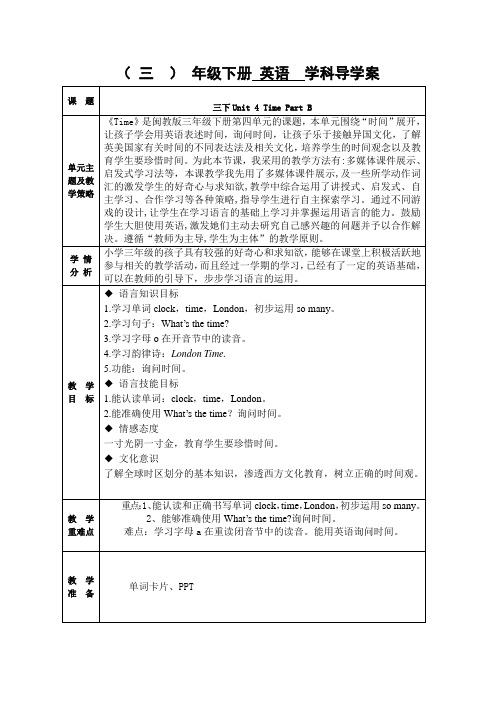
(三)年级下册英语学科导学案板书句子What’s the time?并教学。
(4)游戏——走走停停看时间。
游戏规则:教师拿着卡通纸板钟绕着班级走,边走边拨动钟面。
全班学生不间断地提问:“What’s the time?”教师在一位学生面前停下,这位学生就要接过卡通纸板钟,看着钟回答:“It’s...o’clock.”答对的学生所在的小组得分。
(5)文化渗透。
普及全球时区划分的基本知识,树立正确的时间观。
(二)课文教学1.教授句子:It’s eleven o’clock in Beijing.和It’s three o’clock in London. (1)教师指着黑板上标有Beijing的钟面,对学生说:“It’s eleven o’clock in Beijing.”板书句子并教学。
(2)教师指着黑板上标有London的钟面,对学生说:“It’s three o’clock in London.”板书句子并教学。
2.请全班翻开课本第25页,教师播放课文录音,学生跟着录音模仿说句子。
3.再播放课文录音二到三遍,采用全班学生跟读、个别学生或小组跟读的形式学习对话内容。
(三)语音教学1.复习字母o在重读闭音节中的读音。
(1)教师播放课本第24页第3部分的录音,让学生跟读单词dog,stop,pencil-box,引出字母o发/D/的音。
(2)教师出示单词dog,stop和pencil-box,由学生自主拼读。
2.学习字母o在开音节中的读音。
(1)教师出示单词no,让学生感知单词no中字母o的读音,引出字母o 发//音的教学。
(2)教师出示单词go,nose和home,学生尝试拼读。
(3)请学生翻开课本第26页,教师播放录音,学生模仿跟读。
3.游戏——耳力大比拼。
游戏规则:教师将dog, stop, pencil-box, go, nose和home六个单词随机两两配对,并朗读,让学生判断字母o在这两个单词中的读音是否相同。
部编RJ人教版PEP新目标 初三九年级英语 上册第一学期秋季(优质导学案)Unit 4 导学案
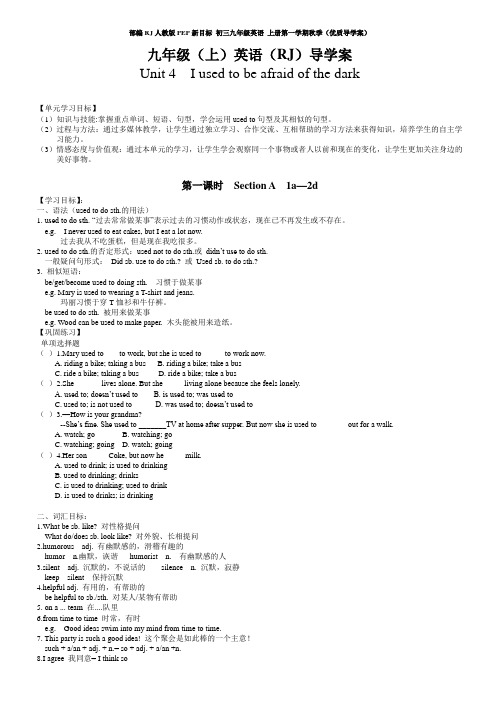
九年级(上)英语(RJ)导学案Unit 4 I used to be afraid of the dark【单元学习目标】(1)知识与技能:掌握重点单词、短语、句型,学会运用used to句型及其相似的句型。
(2)过程与方法:通过多媒体教学,让学生通过独立学习、合作交流、互相帮助的学习方法来获得知识,培养学生的自主学习能力。
(3)情感态度与价值观:通过本单元的学习,让学生学会观察同一个事物或者人以前和现在的变化,让学生更加关注身边的美好事物。
第一课时Section A 1a—2d【学习目标】:一、语法(used to do sth.的用法)1. used to do sth. “过去常常做某事”表示过去的习惯动作或状态,现在已不再发生或不存在。
e.g. I never used to eat cakes, but I eat a lot now.过去我从不吃蛋糕,但是现在我吃很多。
2. used to do sth.的否定形式:used not to do sth.或didn’t use to do sth.一般疑问句形式:Did sb. use to do sth.? 或Used sb. to do sth.?3. 相似短语:be/get/become used to doing sth. 习惯于做某事e.g. Mary is used to wearing a T-shirt and jeans.玛丽习惯于穿T恤衫和牛仔裤。
be used to do sth. 被用来做某事e.g. Wood can be used to make paper. 木头能被用来造纸。
【巩固练习】单项选择题()1.Mary used to ___ to work, but she is used to _____ to work now.A. riding a bike; taking a busB. riding a bike; take a busC. ride a bike; taking a busD. ride a bike; take a bus()2.She ______ lives alone. But she_____ living alone because she feels lonely.A. used to; doesn’t used toB. is used to; was used toC. used to; is not used toD. was used to; doesn’t used to()3.—How is your grandma?--She’s fine. She used to _______TV at home after supper. But now she is used to _______ out for a walk.A. watch; goB. watching; goC. watching; goingD. watch; going()4.Her son _____Coke, but now he _____milk.A. used to drink; is used to drinkingB. used to drinking; drinksC. is used to drinking; used to drinkD. is used to drinks; is drinking二、词汇目标:1.What be sb. like? 对性格提问What do/does sb. look like? 对外貌、长相提问2.humorous adj. 有幽默感的,滑稽有趣的humor n.幽默,诙谐humorist n. 有幽默感的人3.silent adj. 沉默的,不说话的silence n. 沉默,寂静keep silent 保持沉默4.helpful adj. 有用的,有帮助的be helpful to sb./sth. 对某人/某物有帮助5. on a ... team 在....队里6.from time to time 时常,有时e.g. Good ideas swim into my mind from time to time.7. This party is such a good idea! 这个聚会是如此棒的一个主意!such + a/an + adj. + n.= so + adj. + a/an +n.8.I agree 我同意= I think so表示不同意时用I don’t agree 或I disagree9.It’s been three years since we last saw our primary school classmates.自从我们上次小学同学见面以来已经有三年的时间了。
七年级英语下册第四单元Unit 4 导学案

Unit 4 Don't eat in class 第1课时section A 1a—1c学习目标掌握10个单词:rule arrive be on time hallway hall dining listen listen to fight sorry2、掌握并灵活运用句型:What are the rules? Don’t do sth. We can (not) do sth3、能应用所学知识进口语交际学习重点:能应用所学知识进口语交际学习难点:能掌握祈使句的否定句形式学法指导:自主学习交流合作听力训练对话操练学习过程:任务一:自我预习:根据音标读出1a---1c的单词熟读1a 的词组并翻译成汉语。
1. Don’t arrive late for class.2. Don’t run in the hallway.3. Don’t eat in the classroom.4. Don’t listen to music in the classroom or the hallway.5. Don’t fight.fight的用法:1)v. 打架,争吵。
构成词组:①fight for….②fight against….③fight with….2)n. 打架:have a fight 打架。
任务二完成1a1、谈论图片,说出他们在干吗?A: What are they doing? B: They’re fighting.A: What is she doing? B: She is . A: What is he doing? B: He is .2、完成任务(将校规的数字写在学生的旁边)任务三听录音完成1b听力任务1、1b是关于的对话,熟读该对话找出表示规则的用语。
2、比较Don't arrive late for class.和We can't arrive late for class. 的异同。
新人教版初中英语八年级上册Unit 4 导学案
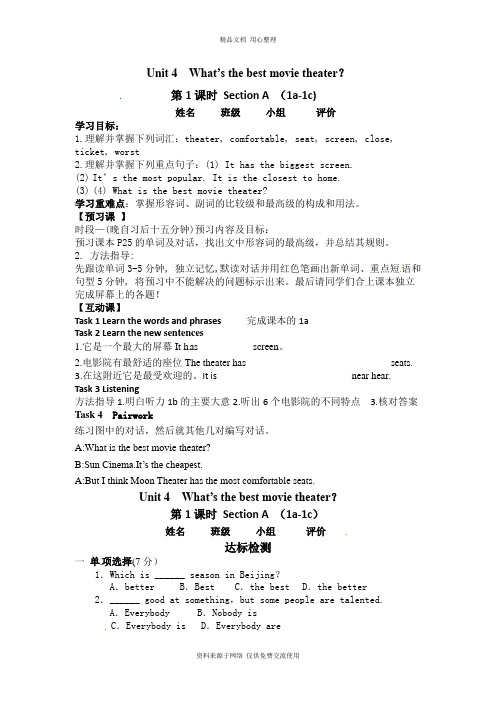
Unit 4 What’s the best movie theater?第1课时Section A (1a-1c)姓名班级小组评价学习目标:1.理解并掌握下列词汇:theater, comfortable, seat, screen, close, ticket, worst2.理解并掌握下列重点句子:(1) It has the biggest screen.(2)It’s the most popular. It is the closest to home.(3)(4) What is the best movie theater?学习重难点:掌握形容词、副词的比较级和最高级的构成和用法。
【预习课】时段—(晚自习后十五分钟)预习内容及目标:预习课本P25的单词及对话,找出文中形容词的最高级,并总结其规则。
2. 方法指导:先跟读单词3-5分钟, 独立记忆,默读对话并用红色笔画出新单词、重点短语和句型5分钟, 将预习中不能解决的问题标示出来。
最后请同学们合上课本独立完成屏幕上的各题!【互动课】Task 1 Learn the words and phrases 完成课本的1aTask 2 Learn the new sentences1.它是一个最大的屏幕It h as ____ ____ screen。
2.电影院有最舒适的座位The theater has ________ _________ _______ seats.3.在这附近它是最受欢迎的。
It is ________ ________ ________near hear.Task 3 Listening方法指导1.明白听力1b的主要大意2.听出6个电影院的不同特点 3.核对答案Task 4 Pairwork练习图中的对话,然后就其他几对编写对话。
A:What is the best movie theater?B:Sun Cinema.It’s the cheapest.A:But I think Moon Theater has the most comfortable seats.Unit 4 What’s the best movie theater?第1课时Section A (1a-1c)姓名班级小组评价达标检测一单项选择(7分)1.Which is ______ season in Beijing?A.better B.Best C.the best D.the better2.______ good at something,but some people are talented.A.Everybody B.Nobody isC.Everybody is D.Everybody are3.—Which is______,the sun,the moon or the earth?—Of course,the moon is.A.biggest B.the biggestC.smallest D.the smallest4.There is a good clothing store__________A.in the town B. on the town C. in town D. on town5.Who jumped the _______of all in the long jump ? Li Lei did.A. longerB. longestC. farther D . farthest6.He is__________ his father.A. as tallerB. the taller thanC. as taller thanD. taller than7. -Which is ________season in Beijing?-I think it’s autumn.A. goodB. betterC. bestD. the best二.单词拼写。
新教材高中英语Unit4 PeriodⅢDevelopingideas导学案外研版选择性必修第一册

Period ⅢDeveloping ideas课前自学导引ART & TECHNOLOGYThink “art”. What comes to your mind? Is it Greek or Roman sculptures in the Louvre, or Chinese paintings in the Palace Museum? Or maybe, just maybe, it's a dancing pattern of lights?The artworks by American artist Janet Echelman look like colourful floating clouds when they are lit up at night. Visitors to one of her artworks in Vancouver could not only enjoy looking at it, they could also interact with it—literally. They did this by using their phones to change its colours and patterns. Exhibits such as these are certainly new and exciting, but are they really art?词汇自测①literally adv. 根据字面意思②look like 看上去像③light up 点亮④interact with 与……互动艺术与科技想一下“艺术”,你想到了什么?是卢浮宫里的希腊或罗马雕塑,还是故宫里的中国画?或许,只是或许,是一个舞动的灯光图案?美国艺术家珍妮特·艾克曼的作品在晚上点亮时看起来就像五颜六色的浮云。
游客们参观她其中一件在温哥华的艺术品时,不仅可以欣赏它,还可以与它进行“互动”——就是字面意思上的互动。
七年级上英语人教新目标版Unit4导学案

Unit 4 Where’s my schoolbag? Section A(1a—2c) 课时1班级:姓名:学号:【学习目标】一、Words: where; table; bed; bookcase; sofa; chair;二、方位介词:in; on; under; behind; in front of; in the front of; nearnext to; between..and…; beside;三、Main sentences: --Where is the schoolbag? --It’s under the table.--Are the keys on the sofa? --No, they aren’t. They’re on the table.四、Talk about the things of your room. Tell where they are.【自主探究】一、幻灯片展示,引出新单词,并教读新单词。
然后完成下列各题。
1. I have two pens. They are on my (书桌).2.—(在哪里) are your keys, Lucy? --In my bag.3.—Is her notebook on the (桌子)? --No, it’s on the (椅子).** have some books in the (书柜).** little cat is (在….下)the bed.二、Complete Activity 1a and 1b, then translate the phrases.在桌子上在书包里在床底下在书柜里在书桌下在沙发上三、方位介词的学习:(1). in在……里面:铅笔在文具盒里。
(2). on在……上面:树上有些苹果。
(3). under在……下面/正下方:你书桌底下是什么?(4).behind在……之后:树后有一辆自行车。
2020年春人教新目标英语八年级下册Unit4全单元导学案设计(无答案)

2020年春人教新目标英语八年级下册Unit4全单元导学案设计(无答案)2020年春人教新目标英语八年级下册U4 第一课时Section A (1a-1c)课前预习【温故检测】Homework, class , sleep , time, friend, advice, problem .可数名词的有:不可数名词的有:【自学检测】:1. How many __________ (tomato) do you need?2. I have __________(too many, too much) homework to do today .3. My parents allow me __________( hang out ) with my friends.4. I got __________(介词填空)a fight with my best friend.5. Why don’t you __________(go) to sl eep ear lier this evening?点拨升华too muc h. “太多”。
1)修饰动词,放在动词之后。
不要吃太多。
Don’t eat ______ _______2)修饰不可数名词。
妈妈有太多家务要做。
Mom has ______ do.1.allow. “允许,准许”。
_______ housework to1)allow sb to do sth. “允许某人做某事”。
Do your parents allow you _________ (play) computer games?2) allowing doing sth. “允许做某事”他们不允许在这里吸烟。
They don’t allow ________ (smoke) here.3) be allowed to do sth. “被允许做某事”我不被允许外出待到很晚。
I am not allowed _______ (stay) out late.2.get into a fight with sb. 和某人打/吵一架。
新目标人教版八年级英语上册复习导学案第三、四单元Unit3-Unit4(无答案)
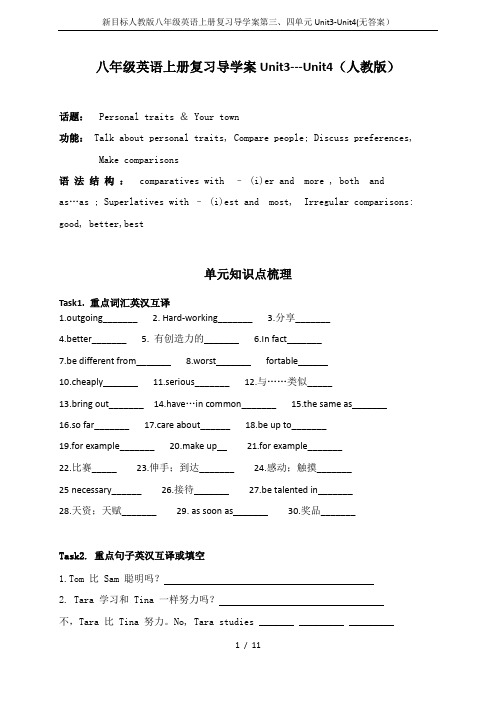
八年级英语上册复习导学案Unit3---Unit4(人教版)话题:Personal traits & Your town功能: Talk about personal traits, Compare people; Discuss preferences, Make comparisons语法结构: comparatives with – (i)er and more , both and as…as ; Superlatives with – (i)est and most, Irregular comparisons: good, better,best单元知识点梳理Task1. 重点词汇英汉互译1.outgoing_______2. Hard-working_______3.分享_______4.better_______5. 有创造力的_______6.In fact_______7.be different from_______ 8.worst_______ fortable______10.cheaply_______ 11.serious_______ 12.与……类似_____13.bring out_______ 14.have…in common_______ 15.the same as_______16.so far_______ 17.care about______ 18.be up to_______19.for example_______ 20.make up__ 21.for example_______22.比赛_____ 23.伸手;到达_______ 24.感动;触摸_______25 necessary______ 26.接待_______ 27.be talented in_______28.天资;天赋_______ 29. as soon as_______ 30.奖品_______Task2. 重点句子英汉互译或填空1.Tom 比 Sam 聪明吗?2. Tara 学习和 Tina 一样努力吗?不,Tara 比 Tina 努力。
Unit 4 When is the art show? Part C(导学案)-2022-2023

Unit 4 When is the art show? Part C(导学案)-2022-2023学年英语五年级下册知识目标•能够询问和回答关于活动时间的问题。
•能够掌握英语中的时间表达方式。
•能够运用所学知识进行日常交流。
能力目标•培养学生的英语口语表达能力。
•提高学生的英语听力和阅读理解能力。
•培养学生的团队合作能力。
重点难点•掌握时间表达方式。
•运用所学知识进行日常交流。
教学过程活动一:时间表达方式1.教师在黑板上画出钟表,向学生展示 12 个小时制和 24 小时制时间表达方式,让学生学习掌握两种方式的表达形式。
2.老师可以给出询问时间的问题,让学生运用所学知识进行回答。
–What time is it now?(现在是几点?)–What time is the art show?(艺术展览的时间是什么时候?)–When does the party start?(派对什么时候开始?)活动二:团队合作任务1.学生分为若干个小组,每个小组内部选举一个组长。
2.教师在课堂上告知学生一个挑战任务:要求学生在 1 分钟内用英语让另一个小组回答以下问题:–What time is it now?–What time is the art show?–When does the party start?学生需要合作高效完成任务,提高团队合作能力。
活动三:时间表达小游戏1.教师设计一个小游戏,让学生在游戏中进行时间表达的练习。
2.游戏规则:学生随机站在教室内任意的位置,老师问“what time is it?”学生需要迅速给出当前的时间表达表达,然后老师宣布“时间前进了几小时”,比如可以说“时间前进了三个小时”,学生需要根据老师的提示更新当前时间并表达出来。
游戏的目的是让学生掌握时间表达方式,并提高他们的英语口语表达能力。
课堂扩展学生可以回家练习口语,每个人都可以组织家人或朋友参与时间表达小游戏,提高实际生活中使用英语的意识,并巩固所学知识。
Unit4 SectionA (2d-3c )导学案 人教版英语七年级上册
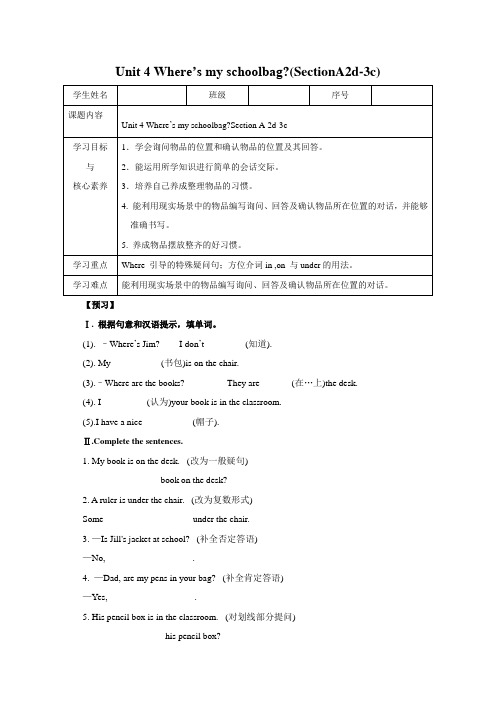
Unit 4 Where’s my schoolbag?(SectionA2d-3c)【预习】Ⅰ. 根据句意和汉语提示,填单词。
(1). –Where’s Jim? --I don’t ________ (知道).(2). My __________ (书包)is on the chair.(3).–Where are the books? --They are ______ (在…上)the desk.(4). I _________ (认为)your book is in the classroom.(5).I have a nice __________ (帽子).Ⅱ.Complete the sentences.1. My book is on the desk. (改为一般疑句)________ ________ book on the desk?2. A ruler is under the chair. (改为复数形式)Some _________ _________ under the chair.3. —Is Jill's jacket at school? (补全否定答语)—No, _________ _________.4. —Dad, are my pens in your bag? (补全肯定答语)—Yes, _________ _________.5. His pencil box is in the classroom. (对划线部分提问)________ _________ his pencil box?【探究】Task1:2d1.Read and answer.1). Where’s Jack’s bag?2). Where’s the map?3). Where’s his hat?2. Language points1)desk的用法易混辨析:table与deskClean the table after lunch. 午饭后清理桌子。
新人教版七年级上册英语unit4第三课时导学案
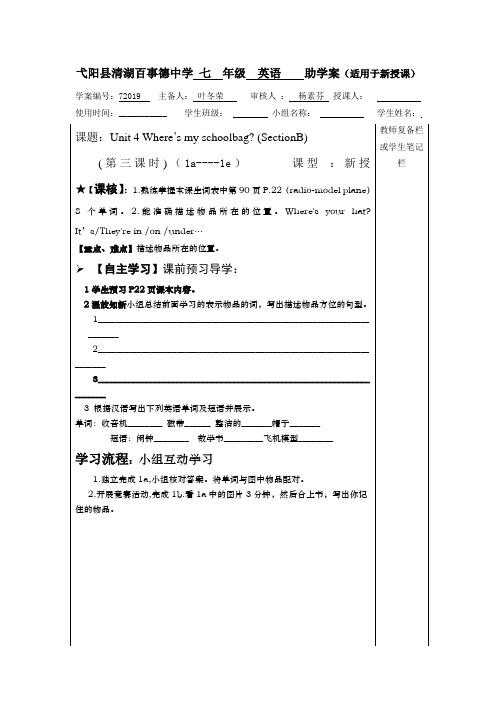
( )3.一Where is the bag?一_________.
A.It's a bag.B.Yes,it isC.On the deskD. It's not my bag
( )4.Her baseball is _______the floorA.inB.onC.underD. behind
学习流程:小组互动学习
1.独立完成1a,小组核对答案。将单词与图中物品配对。
2.开展竞赛活动,完成1b.看1a中的图片3分钟,然后合上书,写出你记住的物品。
【互动探究】
教师复备栏
或学生笔记栏
31c中,Tom wants some things from his room. Listen . What are they?听录音同学们完成1c任务,圈出房间里汤姆想要的物品。看哪一组同学最快最好,并将答案展示在小黑板上。
( )5.一How do you _____“pen”?一P-E-N.
A.ask B.speak C.1isten D.spell
教师复备栏
或学生笔记栏
教师教学反思或
学生学习反思
3_____________________________________________________________________
3根据汉语写出下列英语单词及短语并展示。
单词:收音机________磁带______整洁的_______帽子_______
短语:闹钟________数学书_________飞机模型________
弋阳县清湖百事德中学七年级英语助学案(适用于新授课)
Unit4SpaceExplorationReadingandThinking阅读课教学设计和导学案
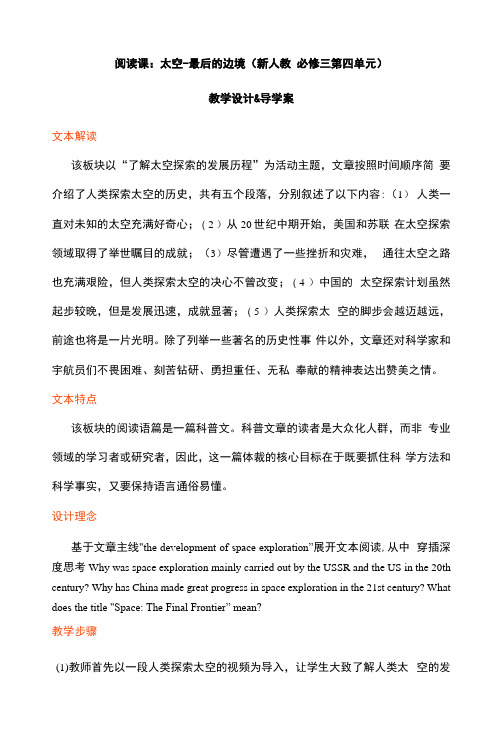
阅读课:太空-最后的边境(新人教必修三第四单元)教学设计&导学案文本解读该板块以“了解太空探索的发展历程”为活动主题,文章按照时间顺序简要介绍了人类探索太空的历史,共有五个段落,分别叙述了以下内容:(1)人类一直对未知的太空充满好奇心;(2 )从20世纪中期开始,美国和苏联在太空探索领域取得了举世瞩目的成就;(3)尽管遭遇了一些挫折和灾难,通往太空之路也充满艰险,但人类探索太空的决心不曾改变;(4 )中国的太空探索计划虽然起步较晚,但是发展迅速,成就显著;(5 )人类探索太空的脚步会越迈越远,前途也将是一片光明。
除了列举一些著名的历史性事件以外,文章还对科学家和宇航员们不畏困难、刻苦钻研、勇担重任、无私奉献的精神表达出赞美之情。
文本特点该板块的阅读语篇是一篇科普文。
科普文章的读者是大众化人群,而非专业领域的学习者或研究者,因此,这一篇体裁的核心目标在于既要抓住科学方法和科学事实,又要保持语言通俗易懂。
设计理念基于文章主线"the development of space exploration”展开文本阅读,从中穿插深度思考Why was space exploration mainly carried out by the USSR and the US in the 20th century? Why has China made great progress in space exploration in the 21st century? What does the title "Space: The Final Frontier” mean?教学步骤(1)教师首先以一段人类探索太空的视频为导入,让学生大致了解人类太空的发展史,为接下来阅读的展开做好铺垫;(2 )学生阅读活动2的四个句子然后阅读课文完成活动2及活动3 ,此环节教师先引导学生学会找topic sentence ,如果没有,学生阅读第40页Summarize the main idea 的策略提示,然后再总结段落大意;(3 )学生再次阅读文本:I.通过表格的形式展示出Para 2&4中的人类探索太空的历史,并且思考Why was space exploration mainly carried out by the USSR and die US in the 20由century?以及21世纪中国航天发生了哪些变化?为什么?该环节主要让学生了解人类太空探索的发展历程及重大历史事件,另一方面帮助学生了解我国在太空探索领域所取得的辉煌成就以及对人类太空探索事业的贡献,从而坚定文化自信,增强爰国情怀和民族自豪感;II. 根据Para3中信息学生可以了解人类为探索浩瀚的宇宙付出了生命的代价,引导学生思考What is the importance of carrying on space exploration? III.总结Para 5中未来太空探索的目标;(4 )讨论文章标题。
人教七年级下册Unit4导学案设计(有答案)
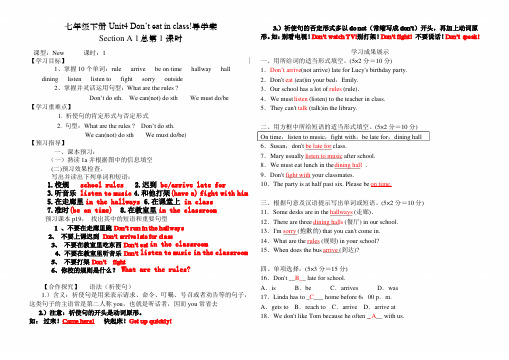
七年级下册Unit4 Don’t eat in class!导学案Section A 1总第1课时课型:New课时:1【学习目标】1、掌握10个单词:rule arrive be on time hallway halldining listen listen to fight sorry outside2、掌握并灵活运用句型:What are the rules ?Don’t do sth.We can(not) do sth We must do/be【学习重难点】1.祈使句的肯定形式与否定形式2.句型:What are the rules ?Don’t do sth.We can(not) do sth We must do/be)【预习指导】一、课本预习:(一)熟读1a并根据图中的信息填空(二)预习效果检查。
写出并读出下列单词和短语:1.校规school rules2.迟到be/arrive late for3.听音乐listen to music4.和他打架(have a)fight with him5.在走廊里in the hallways6.在课堂上 in class7.准时(be on time)8.在教室里in the classroom预习课本p19,找出其中的短语和重要句型1、不要在走廊里跑Don’t run in the hallways2、不要上课迟到Don’t arrive late for class3、不要在教室里吃东西Don’t eat in the classroom4、不要在教室里听音乐Don’t listen to music in the classroom5、不要打架Don’t fight6、你校的规则是什么?What are the rules?【合作探究】语法(祈使句)1.)含义:祈使句是用来表示请求、命令、叮嘱、号召或者劝告等的句子,这类句子的主语常是第二人称you,也就是听话者,因而you常省去2.)注意:祈使句的开头是动词原形。
高一英语必修一U4导学案
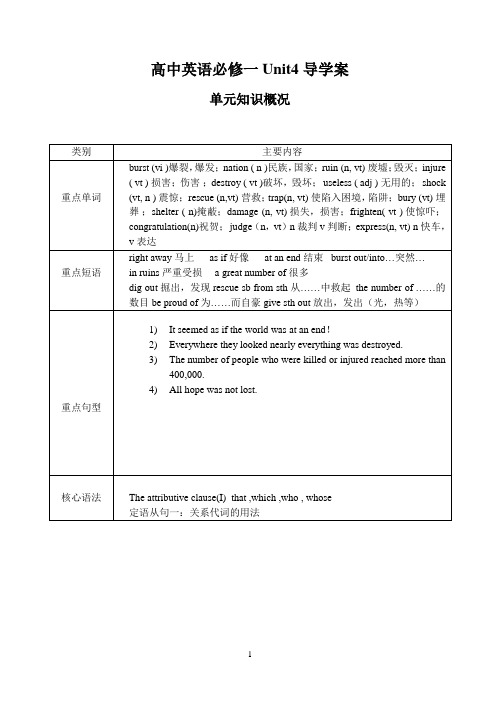
高中英语必修一Unit4导学案单元知识概况Module 1 Unit 4Section I Vocabulary一、词汇拓展1._____________ vt. 破坏,毁灭,消灭______________n.毁坏,破坏______________adj.破坏性的,毁灭性的2. injure vt. 伤害,使受伤____________n. ____________adj.受伤的__________adj. 有害的___________adv.有害地3. shock vt. 使震惊,震动n.休克,震惊_____________adj. 令人震惊的_____________adj. 感到震惊的______________ [搭配]对……感到震惊4. judge v.& n.判断,评判,法官,裁判____________n.判断,看法5. ________adj.新的;新鲜的_________________新生v. 使···新鲜___________ freshener___________ v. ___________(使振作;使恢复)6. _____________n.电;电流;电学________ adj.用电的;带电的____________ adj.与电有关的_____________adj.电子的7. survive v. 生存,幸存_______n.幸存_________ n.幸存者8. congratulation n.祝贺;(复数)贺词___________ v.祝贺______________________ 祝贺某人某事9. frighten vt. 使惊吓,吓唬__________adj. 受惊的___________adj令人恐惧的10. honour n.____________ adj. 光荣的;荣耀的11. nation n. 国家,民族______________ adj. 国家的,民族______________ adj. 国际的______________ adj. 本国的,土著的______________ n. 国籍12. extreme adj. 极度的_____________ adv.非常地_____________ n.极端主义者,过激分子_____________ n.极端主义13.bury v. 埋葬,隐藏______________ adj.埋葬的,隐藏的______________ n. 埋葬,葬礼二、巩固提升Fill in the blanks with the proper form of the given words.1. ⑴Before the fireman arrived,the whole building ____________________ (destroy)in the fire.⑵So ___________ (destroy) was the force of this flood that few land animals and plantssurvived.⑶People were shocked by the _________ (destroy) of the city.2. ⑴The _________ (injure) passengers were rushed to the hospital.⑵Smoking is __________ (injure) to the lungs.⑶Her ________ (injure) forced her to resign from the State Department.3. ⑴I got a ________ (shock) news for you!⑵I was_________ (shock) to hear that he had been fired.⑶The news came as a _______(shock) to us all.4. ⑴_______ (judge) from/by his expression,he was angry.⑵Tom is too quick to make _________ (judge) about other people.⑶The ______ (judge) sentenced him to ninety days in prison.5. ⑴For those who have been working hard for a whole week, the weekend is a happy time for them to relax and________ (fresh).⑵Finally, you'll want to gently brush your tongue to remove more bacteria and ___________ (fresh) your breath.⑶Plenty of _________(fresh) air contributes to good health.6. ⑴Mr. Edison produced not just a light bulb, but an _________(electricity) system.⑵If the tax were large enough, people would start driving ________(electricity) cars.⑶Actually I was trained as an ____________ (electricity) engineer.7. ⑴I even get ___________ (frighten) when I hear a plane fly over.⑵What was the most ____________ (frighten) experience you've had?⑶Mother's calm behavior made the _______ (frighten) child quiet.Module 1 Unit 4Section II Warming up, pre-reading and reading知识回顾根据句子意思,用括号里所给单词的适当词性完成句子。
Unit 4 Don’t eat in class复习导学案

七年级英语下册导学案No.3姓名:__________ 学号:________ 评定等级__________Unit 4 Don’t eat in class.(第一课时)短语归纳1. on time 准时,按时2. listen to …听……3. in class 在课上4. be late for 做……迟到5. have to 不得不6. be quiet 安静7. go out 外出8. do the dishes 清洗餐具9. make breakfast 做早饭10. make (one’s) bed 铺床11. be noisy 吵闹12. keep one’s hair short 留短发13. play with sb. 和某人一起玩14. play the piano 弹钢琴15. have fun 玩得高兴16. make rules 制订规则用法集萃1. Don’t + 动词原形+其他,不要做某事2. help sb. (to) do sth. 帮助某人做某事3. too many + 可数名词复数太多的……4. practice doing sth. 练习做某事5. be strict with sb. 对某人要求严格6. be strict in sth. 对某事要要求严格7. leave sth sp. 把某物忘在某地8. keep + 宾语+形容词使……保持某种状态9. learn to do sth. 学会做某事10. have to do sth. 不得不做某事经典句型必背1. Don’t arrive late for class. 上课不要迟到。
2. Can we bring music players to school? 我们可以带音乐播放器到学校吗?3. And we always have to wear the school uniform. 并且我们总是不得不穿校服。
【导学案】Unit4 Houmor Lesson3 导学案

Unit 4 HumourLesson 3 My Favourite Comedian学习目标1. 掌握本节生词、短语及句型的表达与运用。
2. 掌握副词的用法。
3. 通过课堂练习,对课文内容有更深入的了解。
知识运用1. recognise词性:____________ 意思:_____________recognise v. 认出;承认recognise sb./ sth.by / from… 根据……认出某人/ 某物recognise sb./ sth. as/ to be… 承认某人/ 某物是……他被公认为19世纪最伟大的诗人之一。
It is recognised that... 人们公认……out of/ beyond recognition 认不出来recognisable adj. 可认出的练习:He is _____________ to be one of the greatest poets in the 19th century.2. reputation词性:____________ 意思:_____________have a reputation for… 因……而出名live up to one's reputation 不负盛名,名副其实damage/ ruin one's reputation 损坏某人的名声earn/ establish/ build a reputation 赢得/ 确立/ 树立名声练习:The restaurant earns a good _____________ for its survice.3. amuse词性:____________ 意思:_____________amuse oneself 自娱自乐amusing adj. (事物等) 好笑的/ 有趣的amused adj. (人等) 被逗乐的/ 感到有意思的amusement n. [U] 开心,乐趣;[pl.] 娱乐活动练习:She made faces to __________ the children.4. attempt词性:____________ 意思:_____________make an attempt to do sth. 尝试做某事at the first attempt 第一次尝试at one's first attempt 某人第一次尝试in an attempt to do sth. 试图做某事attempt to do 尝试去做attempt at doing sth. 试图做某事练习:I will ___________ to answer all your questions.5. desperate词性:____________ 意思:_____________in desperate need 极其需要be desperate to do sth. 急切做某事be desperate for sth. 渴望得到某物desperation n. 绝望in desperation 绝望地;拼命地desperately adv. 绝望地练习:The man felt ___________ as he didn't know the right direction.6. talent词性:____________ 意思:_____________show a talent for 表现出……才能have a talent for对……有天赋;有……的天赋talented adj. 有天赋的;有才华的练习:He has a ___________ for music.7. occur词性:____________ 意思:_____________It occurs to sb. that… 某人突然想到……It occurs to sb.to do sth. 某人突然想起做某事occur to sb. 某人想到……occurrence n. [C] 事件;[U] 出现;发生练习:It didn't ___________ to her to ask for help.8. convince词性:____________ 意思:_____________convince sb. of sth. 使某人相信某事convince sb. to do sth. 说服某人做某事convince sb. that... 使某人相信……convincing adj. 令人信服的练习:How can we ___________ him that he's wrong?9. rely on意思:_____________rely on sb. for sth. 依靠某人得到某物rely on sb.to do sth. 指望/ 依赖某人做某事rely on it that... 相信……;指望……depend on 依靠(提供资金、帮助等)reliable adj. 可靠的练习:I have no choice but to ___________ you.10. on the contrary意思:_____________quite the contrary 恰恰相反to the contrary 相反be contrary to 与……相反;违反练习:I'm not ill, ________________, I'm very well.阅读探究Read and Explore:Read Text 1. Make inferences about Mr Bean and the author.1. Why does Mr Bean go to a fancy restaurant on this particular day?2. Does Mr Bean have many friends? How do you know?3. Why does Mr Bean choose the "steak tartare"?4. Why does Mr Bean pretend to like the food when the waiters ask him?5. Why does the author say that he wouldn't want to meet someone like Mr Bean in real life?句型梳理1.(教材P14)He then looks from the menu to the money with concern until he finds one thing that makes him smile.然后他担忧地看看菜单又看看钱,直到他找到一件令他微笑的东西。
- 1、下载文档前请自行甄别文档内容的完整性,平台不提供额外的编辑、内容补充、找答案等附加服务。
- 2、"仅部分预览"的文档,不可在线预览部分如存在完整性等问题,可反馈申请退款(可完整预览的文档不适用该条件!)。
- 3、如文档侵犯您的权益,请联系客服反馈,我们会尽快为您处理(人工客服工作时间:9:00-18:30)。
Unit 4 Why don’t you talk to your parents?
Section B 1a-2b(第3课时)
【学习目标】
1.知识目标:new words and phrases
2.能力目标阅读策略(guessing the meaning)
【学习重难点】
2b中的短语和搭配
【导学过程】
从课文中找出下列短语
1.给...压力
2.与…竞争
3.与…作比较
4.足球训练
5.典型的美式家庭
6.孩子的发展
7.push ...hard 8. In one’s opinion
9.造成压力______________ 10.校外辅导班______________
【知识链接】
1.继续、持续做
keep (on)doing;go on doing ;continue doing
若将doing 换成to do,则指继续去做另一件事
pare to 把...比作.../compare with把...与...对比
Life is poetically compared_______ the morning dew.
在诗歌中,人生被比喻为朝露。
Compared ________western countries, China uses materials very carefully.
和西方相比,中国使用物资很节省。
2.develop动词;它的名词是________;
形容词有两种:developing(发展中的)developed(发达的);
试译:发展中国家___________________发达国家______________
【合作探究】
一、选出正确的句子,使对话通顺
W: Alice, help me!_________
A: Hey, Wei Ming. Although you may be unhappy with your parents, you should talk to them.__________
W: It’s because they want me to get good grades.
A: ___________Free time activities like sports and hanging out with friends are important, too. W: I totally(完全地) agree. I need more free time to do activities I enjoy.
_______________________________________________________
A: Yes, you won’t get good grades if you’re stressed out all the time.
W: I also keep worrying about getting better grades than my classmates.
A: Oh, ____________You should all be helping each other to improve.
W: You’re right. Thanks f or all the good advice, Alice.
二、根据句意和首字母提示填空。
1. I’m going to give my brother a football as a birthday p_________.
2. With his help, I have made great p________ in my subjects.
3. My grandma is n_______ eighty years old, but she is very healthy.
4. Tom likes coffee r________ than tea.
5. Could you hear me c________?
B) 用所给词的适当形式填空。
6. There are a lot of __________ (mouse) in the house.
7. My father made the _________ (suggest) that I go there by bike.
8. Many people in China have _________ (person) computers at home.
9. The little baby fell _________ (sleep) soon after the music began to play.
10. Who is the _________ (win) of the game?
【巩固练习】
一.选择填空
1. Maybe you should __________ .
A. call in her
B. call up her
C. call her up
2. Brian doesn’t like __________ . A. reading B. read C. reads
3. Yesterday I went to the library. Henry went there, ________ .
A. either
B. too
C. also
4. Charles’ cousin is the same age ________ him. They get on well ______ each other.
A. as, with
B. as, on
C. as, in
5. _______ he’s old, he can still carry this heavy bag.
A. Though
B. Since
C. For
6.. I hurried _____ I wouldn’t be late for class.
A. since
B. so that
C. unless
7.The teacher raised his voice _______ all the students could hear him.
A. for
B. so that
C. because
8 .We won’t start ______ Bob comes. A. until B .if C. unless
二.根据课文内容完成句子
1.父母在学习上给我太多压力。
My parents _________ me too much ________ about school .
2.他们总是把自己的孩子和别的孩子比。
They are always __________ _their children _____others.
3.太多的压力对孩子的发育不好。
Doctors say too much pressure isn’t good for ________ __________.
4.人们不该把孩子逼那么紧。
People ______ _______ their kids so_______.
5.生活不应当只是成绩
Life shouldn’t just __________ _______ grades.
反思_________________________________________________________________________ _____________________________________________________________________________。
